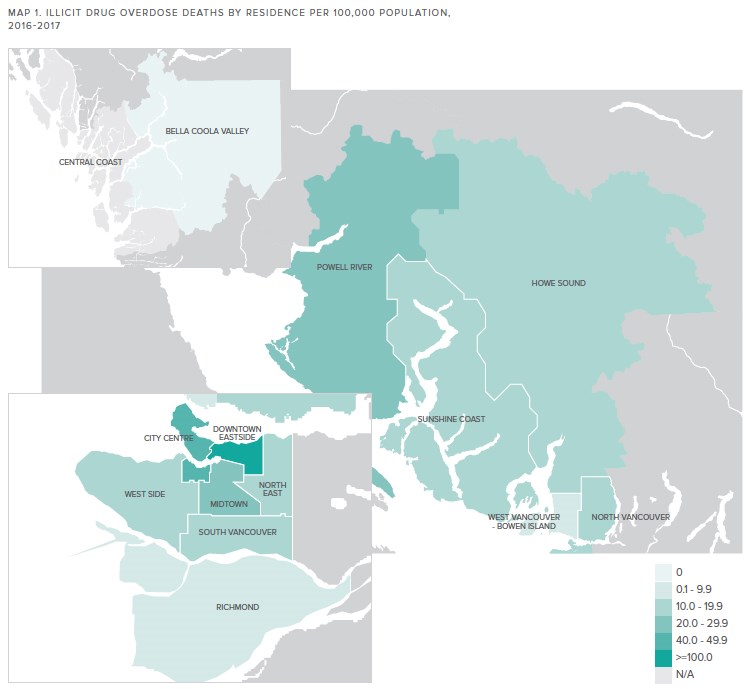A new report on the opioid overdose crisis from Vancouver Coastal Health (VCH) shows that the Sunshine Coast and Powell River are being “disproportionately affected.”
Dr. Patricia Daly, VCH’s chief medical health officer, makes 21 recommendations including a call to expand programs that help prevent problematic substance use, and having a regulated supply of drugs as an alternative to the contaminated illegal supply.
Daly’s report looks at data from the BC Coroners service on illicit drug overdose deaths from 2012 to 2018, a review of the medical records of 424 people who died from overdoses in VCH’s catchment area in 2017, and a review of the effectiveness of response programs.
The data has yielded new information that “is shedding light on where to focus resources to save even more lives,” said Daly in a release accompanying the report.
The report also says that the overall overdose death rate in VCH is the highest of any health authority in the province, with the highest rates in the City of Vancouver, and the city’s Downtown Eastside.
“Outside of Vancouver, some smaller rural communities such as Powell River and the Sunshine Coast are also disproportionately affected,” the report also notes.
Data from 2016-2017 shows the Sunshine Coast with a rate of deaths from illicit drug overdose ranging from 10 to 20 per 100,000 population and Powell River with a rate between 20 and 30 per 100,000.
Vancouver’s Downtown Eastside had a rate of more than 100 per 100,000 population for the same period.

“The overdose crisis needs a coordinated community response from many different sectors and the public at large,” Daly said and the report also mentions the success of the four Community Action Teams in the VCH region, which includes one on the Sunshine Coast and one in Powell River.
The CATs include stakeholders from local government, non-profit groups, first responders and RCMP, and First Nations.
“Peers play a critical role on the VCH region’s four Community Action Teams (CAT),” the report says. “CATs provide valuable forums for local stakeholders to review and act on community level overdose data… Peers are critical to the success of the teams by drawing on wisdom from lived experience to challenge local policies that might contribute to stigma, identify service barriers, and work collaboratively to ensure the overdose response is responsive to the diverse needs of people who use drugs.”
The District of Sechelt recently stepped in to fund the local CAT’s outreach work through the end of July while the group waited for confirmation of renewed funding from the province. That funding has now come through in the amount of $100,000 for 2019/2020.
The first overdose prevention site outside the Lower Mainland recently opened in Powell River, and Daly told Coast Reporter that a similar initiative could be considered for the Sunshine Coast, but isn’t being pursued at this point.
“I think we’re going to look at what the Community Action Team identifies might be the need. That’s something I will leave to the community to decide if that’s a service they might need,” Daly said. “We’ve also been able to offer overdose prevention services in other ways, you don’t necessarily need a stand-alone site.”
Daly said information coming from initiatives like the Community Action Teams is one of the reasons she’s calling her recommendation for a regulated supply and decriminalization the “single most urgent.”
“Decriminalizing substance use would help reduce stigma and social isolation for people who use drugs, leading to better access to health care and social support,” said Daly “Moving beyond decriminalization, legalization and regulation of all psychoactive substances would reduce people’s dependence on the toxic illegal supply, criminal drug trafficking and illegal activities that people with addictions must engage in to finance their drug use.”
The full report is available for download at www.vch.ca/public-health



